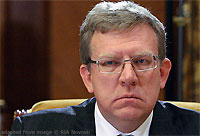Pouring govt money into economy more likely to fuel inflation than production – Kudrin

(Interfax – MOSCOW, April 30, 2013) Massive injections of government money into the Russian economy will do more to fuel inflation than to accelerate growth in production, the government should act to extend greater economic freedom, former Finance Minister Alexei Kudrin, who now chairs the Civil Initiatives Committee, believes.
“When the government starts going in with its money through development institutions, (a(euro) ) it seems to it that a plantneeds to be built now and they’ve even approximately figured out how it will pay for itself, maybe even without in-depth research, consultations with experts (a(euro) ), the government does not get around to do in-depth analysis and starts creating enterprises that are then unsuccessful and inefficient,” Kudrin said on the radio station Serebryany Dozhd.
Throwing money at projects in this way is ineffective management, he said. “For example, right now the government is discussing – let’s quickly give another 500 billion rubles to projects. I assure you that these will be the very worst projects, because they will be slapped and thrown together quickly, because it seems that now it is necessary to start a lot of projects, but they’re not ready, work wasn’t done on them. Secondly, these projects do not participate in the competition between all budget expenditures, so those are selected that were abandoned on the eve of the preparation of the last budget because there wasn’t enough money for them,” Kudrin said.
Therefore this creates “more negative than positive,” he said. “There might even by short-lived growth that we will maintain for a bit, but it could result in worse consequences in the form of inflation, additional outflow and less resources will remain to support production,” Kudrin said.
“(A)ny major injections into our economy now will go 50% into inflation and additional prices, 25% into outflow and only 25% into some kind of stimulus of production,” Kudrin said, adding that this is “an expert position and it coincides with that of our colleagues.”
Not a single spontaneous stimulus measure aimed at saving “ourselves from recession by the end of the year” will save the economy because “the influence that such types of measures have on the economy has its period, time, time lag,” he said.
Kudrin believes that “virtually nothing can be done already” in 2013.
He also said that Russia is not heading for a recession this year, despite the “clear symptoms that this year there will be a minus.”
“I don’t think that we’ll fall into recession this year, although the symptoms are worrying. A recession is two quarters of decline, it’s when negative monthly rates begin, then they’ll start saying that it has begun,” Kudrin said.
“I think that this year we will avoid (a recession),” he stressed. Government stimulus measures will be needed when GDP growth begins “to fall below 1% or 2%,” he said.
He also urged the government to turn its attention to the structural problems of the Russian economy. “They need work. Let’s simplify the regime of administration for a whole range of government functions, quickly make decisions to reduce barriers, perhaps temporarily, we need to stimulate the expansion of economic freedom,” Kudrin said.
